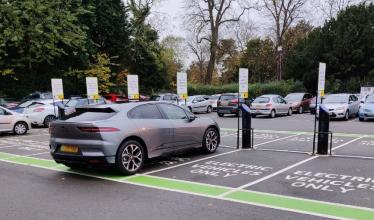Following the Prime Minister’s decision to delay the ban on sales of new diesel and petrol cars to 2035, the Government has announced that the zero emission vehicle (ZEV) mandate, which outlines the % of car manufacturer’s sales which must be zero emission in 2030, remains at 80% for cars but is reduced to 70% for vans.
The original proposal for 22% of new cars, and 10% of new vans sold in 2024 to be electric vehicles remains in place.
The 100% target by 2035 remains but the interim targets from 2030 will be announced at a later date.
Some manufacturers plan to reach 100% electric vehicle (EV) production sooner than the new 2035 cut-off.
“After the watering down on the ban on new cars last week, it is good to see the government now confirming the ZEV mandate and providing some certainty to the market,” said Melanie Shufflebotham, COO and Co-founder of Zapmap.
“There is significant momentum in the new car market in the UK, and a concerted effort to move to EVs for private and public transport are both essential to the UK’s net-zero goals.
“Whilst there is still work to do, the UK public charging infrastructure is growing rapidly, at the end of August 2023 there were more than 48,000 EV charging points across the UK in more than 29,000 locations – an impressive annual increase of 42% of the total number of devices, according to our data at Zapmap.
“Last month alone, we added more than 2,700 to the Zapmap app and many of these are the high-powered ultra-rapid chargers needed for longer journeys."
In its ZEV mandate statement, the Government admitted EVs were “cheaper to run than petrol and diesel cars, with research showing that electric cars are around £150 cheaper to maintain a year.”
These cost averages extend beyond maintenance saving, with the cost to charge at home estimated at around 7p/mile, which can be lower still with the use of solar panels or an off-peak tariff.
For those drivers who also use the public charging network, the Zapmap Price Index compares different EV driver charging profiles. This shows that most EV drivers will pay between 11p and 13p/mile, this compares to 15p/mile for an efficient petrol or diesel car.
This not only underscores the affordability of running an EV, but also highlights the potential for substantial long-term savings in fuel costs.
“Our mandate provides certainty for manufacturers, benefits drivers by providing more options, and helps grow the economy by creating skilled jobs,” said Transport Secretary Mark Harper.
“We are also making it easier than ever to own an electric vehicle, from reaching record levels of charge points to providing tax relief for EV owners.”
As of the end of August 2023, there are now around 850,000 fully electric cars on UK roads and a further 530,000 plug-in hybrids. In August, fully electric cars accounted for over 20% of all new car sales.
“Today’s response by the Government is a welcome one, giving clarity on the future of the EV market,” commented Matthew Adams, Transport Policy Manager at The Association for Renewable Energy and Clean Technology.
“I am pleased to see that the Government have listened to us and our members regarding the importance of the sales targets and the need for extra measures for van manufacturing.
“We also understand the reduction in the range for ZEVs which will play a role in protecting the production of lighter BEVs with smaller ranges and are further pleased to see that a Wheelchair Accessible Vehicle Zero Emission Transition Group will be established to provide further input and guidance into the future of electrification of Wheelchair accessible vehicles.
“We will continue working with our members and Government to ensure that the ZEV mandate remains one of the most ambitious pieces of legislation by any Government and that future EV policy remains consistent in its purpose to decarbonise the UK as quickly as is functional and allow the EV sector to reach its full potential.”



